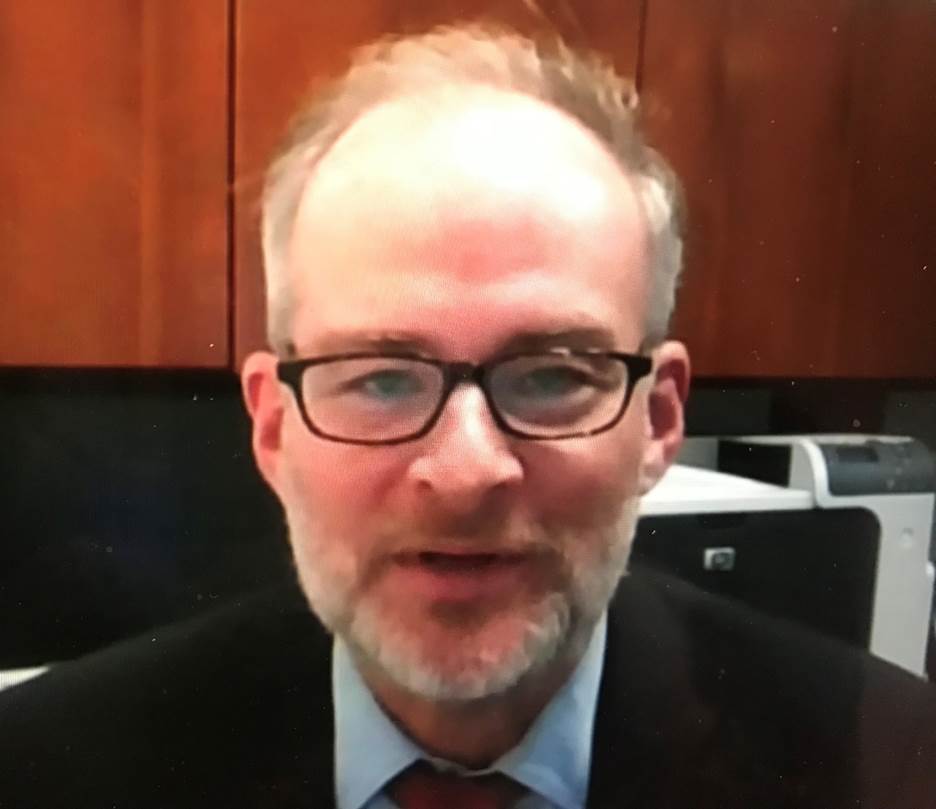
AmbassadorMasood Khan: “This youth dividend and this youth wealth that we have…should make Pakistan an attractive destination for the United States and for other countries as well,” he stated. “This is not something futuristic. This is happening already. Presently, there are about 80 American enterprises already investing in Pakistan… which are supporting about one million households, and they directly employ 150,000.”

Adam Weinstein of the Quincy Institute commented on the resilience of the Pakistani people and that he has always been moved by the “charitable nature of Pakistanis to their fellow Pakistanis in crisis.”

Steve Rynecki: “I’ve never seen so many talented and hard-working optimists in a place where many people see negativity.”
Ambassador Masood Khan on Flood Recovery Efforts and US-Pakistan Relations
By Elaine Pasquini
Photos by Phil Pasquini

Washington: The international community and global financial institutions generously came to the aid of Pakistan at the Resilient Pakistan conference held in Geneva on January 9 by collectively pledging over $9.7 billion for reconstruction and rehabilitation of the country’s flood-affected areas. In addition, the United States committed more than $200 million in aid to Pakistan for infrastructure rebuilding, revitalizing the agricultural industry and to alleviate poverty.
Pakistan, the fifth most populous country in the world, contributes less than one percent of global carbon emissions. Despite this, it is still among the top ten most vulnerable countries to the impacts of climate change.
On January 31, the Quincy Institute for Responsible Statecraft hosted Masood Khan, Pakistan’s ambassador to the US, to discuss the situation five months after the historic floods, which affected 33 million people, caused the deaths of at least 1,500 and left one-third of the country submerged underwater.
While the intense fury of the floods has passed, the main problem, Ambassador Khan reported, is the large number of people still internally displaced living in temporary shelters. In addition to the immense task of rebuilding destroyed infrastructure, waterborne diseases are a major concern. “The situation is still dire and we’re living with the consequences of these epic floods of last year,” he said. “We have to restore lives and livelihoods and create new economic opportunities for people.”
Khan stressed that the federal and provincial governments should work together on the reconstruction projects, but the bulk of the work would be done by Sindh, Balochistan and Khyber Pakhtunkhwa provinces which were the hardest hit. “Their governments are responsive to different challenges and are ready to absorb whatever help comes to them,” he explained. “They have to kickstart these projects because hundreds of thousands of people are still in temporary shelters.”
Acknowledging that Pakistan needs international help to recover and rebuild after the flood disaster, the ambassador thanked the United States and the international community for their generous financial assistance. Pakistan, however, “should not be seen as a country which only needs to be helped,” he emphasized. “It is a country which has a lot of promise.”
Pakistan, a country of 231 million, has a growing middle class estimated to be between 80 to 100 million, the ambassador continued, and also has a large educated population with hundreds of thousands of students graduating from universities, joining the Pakistani market and being absorbed by the international markets. “This youth dividend and this youth wealth that we have…should make Pakistan an attractive destination for the United States and for other countries as well,” he stated. “This is not something futuristic. This is happening already. Presently, there are about 80 American enterprises already investing in Pakistan… which are supporting about one million households, and they directly employ 150,000.”
Steve Rynecki, director for USAID’s Office of Climate and Sustainable Growth at the US Embassy in Islamabad, noted that one of the things that really stands out to him in Pakistan is its youth. “I’ve never seen so many talented and hard-working optimists in a place where many people see negativity.” Armed with English language skills and good internet connections, “you have some skills that are portable via the internet. This is something I think is untapped and has the potential to put Pakistan on the global map for economic exports being digital exports from talented individuals.”
Emphasizing the importance of the diaspora community, Rynecki related that USAID recently conducted two large US-Pakistani diaspora investment conferences to try to mobilize upwards of $75 million worth of investment from Pakistanis residing in the United States. The conferences focused on, among other issues, investing in entrepreneurship and assisting small agricultural businesses to get back on their feet. Agriculture is important to Pakistan for food security, but also for the economy as agriculture was a $4.4 billion industry prior to the floods.
Looking at Pakistan from a security standpoint, Rynecki pointed out that the US benefits from a stable Pakistan. “Our work here at USAID is to help make Pakistan a success as much as we possibly can in order to create conditions for longtime peace and prosperity between our countries and in the region.”
Last year US ambassador to Pakistan Donald Blome launched the US-Pakistani Green Alliance, a framework for deeper bilateral cooperation to mobilize scientific expertise, private sector innovation, community leadership, government support and higher education brain power to identify the most acute challenges that are facing Pakistan.
Included in the Alliance are climate smart agricultural projects to help solve some of the agricultural sustainability issues including reducing carbon emissions. Tackling water management and water storage is important, also, he said. Climate change is causing water to run off the glacier caps into the Arabian sea, so capturing and storing that water runoff is an important project for energy, livelihoods and for life itself, Rynecki explained.
In closing, moderator Adam Weinstein of the Quincy Institute commented on the resilience of the Pakistani people and that he has always been moved by the “charitable nature of Pakistanis to their fellow Pakistanis in crisis.”
Also noting the resilience of Pakistanis, Ambassador Khan stated: “We are confident. We have resilience; we have demonstrated resilience in the past and we’ll make it. We are a nation that has faced many storms and survived, and we will continue to survive and hopefully thrive in the near future.”
(Elaine Pasquini is a freelance journalist. Her reports appear in the Washington Report on Middle East Affairs and Nuze.Ink.)

